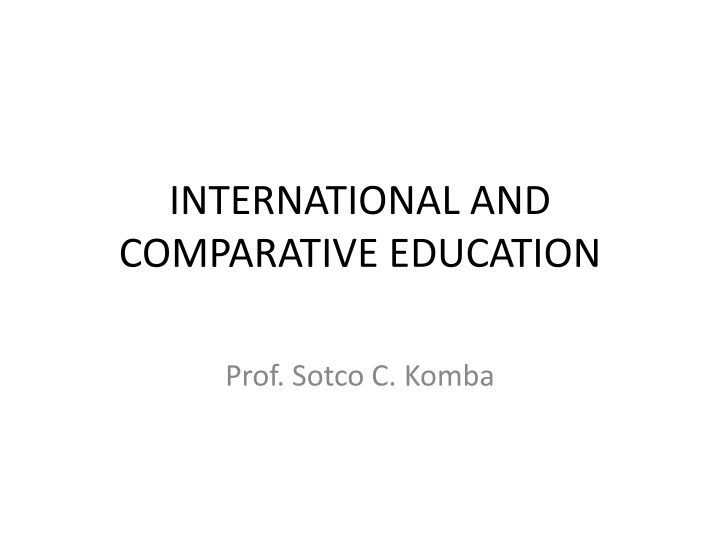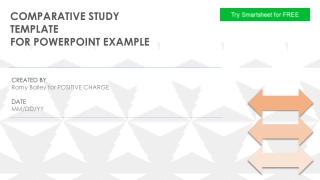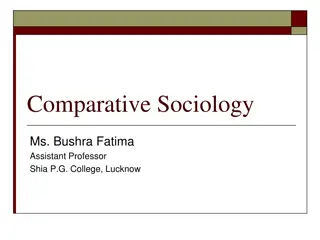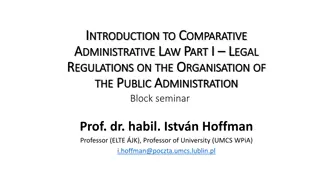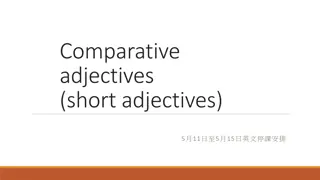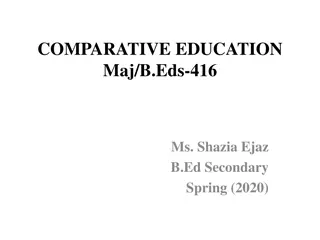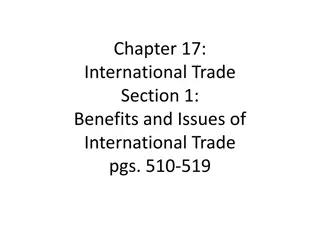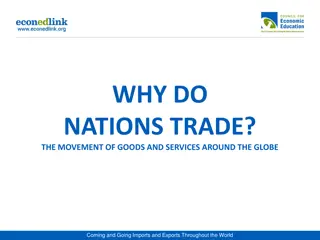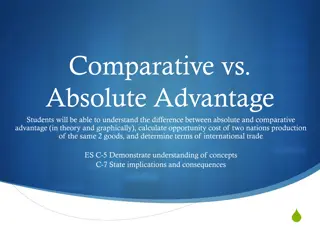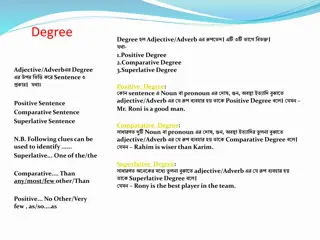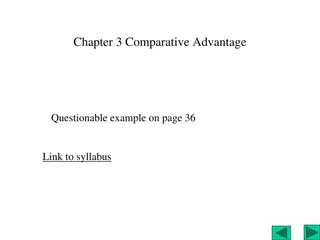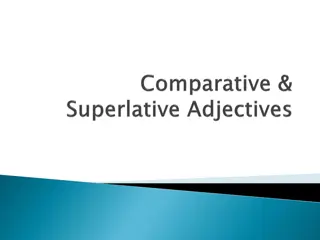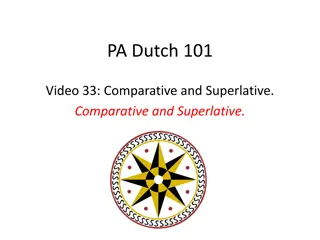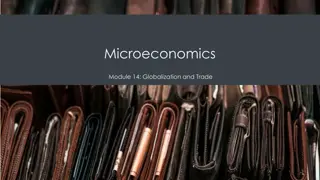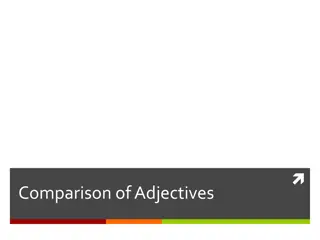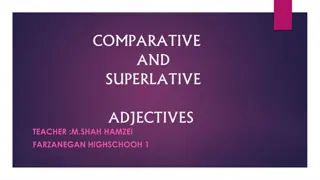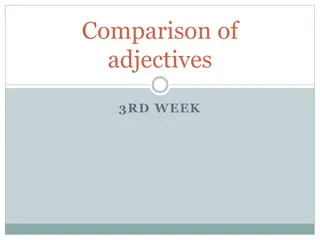Comparative Education: Theory and Practice Comparison
Comparative Education involves the comparison of educational theory and practice across different countries to deepen understanding and identify solutions to common problems. It serves multiple purposes such as describing educational systems, assisting in institutional development, highlighting education-society relationships, and establishing generalized statements valid in multiple countries. International Education transcends national borders, promoting a comprehensive, multicultural approach to prepare students for active engagement in a globalized world.
Download Presentation

Please find below an Image/Link to download the presentation.
The content on the website is provided AS IS for your information and personal use only. It may not be sold, licensed, or shared on other websites without obtaining consent from the author.If you encounter any issues during the download, it is possible that the publisher has removed the file from their server.
You are allowed to download the files provided on this website for personal or commercial use, subject to the condition that they are used lawfully. All files are the property of their respective owners.
The content on the website is provided AS IS for your information and personal use only. It may not be sold, licensed, or shared on other websites without obtaining consent from the author.
E N D
Presentation Transcript
INTERNATIONAL AND COMPARATIVE EDUCATION Prof. Sotco C. Komba
Definition Comparative Education is a field of study dealing with the comparison of current educational theory and practice in different countries for the purpose of broadening and deepening understanding problems beyond the boundaries of one's own country (Carter Good 1962) of educational
Cont.. Comparative Education is a field of study dealing with the comparison of current educational theory and practice in different countries for the purpose of broadening and deepening understanding problems beyond the boundaries of one's own country (Carter Good 1962). of educational
Cont.. Comparative examination of other cultures and other systems of education deriving from those cultures in order to discover resemblances and differences, and why variant solutions have been attempted (and with what result) to problems that are often common to all (V. Mallinson 1975 Education is a systematic
Why comparing education systems We compare national education systems for a multitude purposes: For international understanding For educational improvements or reforms e.g. The introduction of OUT was a product of stdies on distance education conducted in other places in the world. For explaining variations in practices between and among education systems.
Purposes CE serves different purposes Describing educational systems, processes, or outcomes Assisting in the development of educational institutions and practices Highlight the relationships between education and society Establish generalized statements about education that are valid in more than one country. (Harold Noah 1985)
International education Education that transcends national borders through the exchange of people Travelling to study abroad A comprehensive approach to education that intentionally prepares students to be active and engaged participants in an interconnected, multicultural world and dynamic global economy.
Rationale for studying Comparative education Comparative education provides reference for reforms. Comparative education helps students to acquire better understanding of education system of other countries and borrow some aspects for better improvement of education at home. Comparative education help students to understand how educational systems are shaped by wealth, ideology, social cultural features of the country and impacts of globalization on education policy and practice in different regions and countries
Methodological approaches for studying comparative education Two broad categories traditional approach descriptive/statistical method historical approach. modern approach analytical and Sociological synthetic approaches.
The statistical/ Quantitative method Emphasize the collection, Interpretation verification and comparison of data in education by using statistical/Quantitative analytical charts. E.g. number of students at a certain stage of education, expenditure on them, the percentage of passes and failures at various stages of education, expenses on teachers' salaries, school building and other items These are all collected and the same compared with identical data of another country. Thus, the progress or decline of education in any country is statistically analyzed.
Challenges Unreliability of statistical data Imprecision of certain non-standardized term through the statistical method, we cannot understand the educational characteristics that could be as a result of social, cultural, economic, political, and religions situations of a country. verification of data in international studies is not always possible due to cost and travel constraints.
Descriptive Method used in the 19thcentury because the main purpose then in comparative education was to incorporate the good points of another country called for a detailed description of educational affairs of another country. Visits followed by a compilation of descriptive reports
Historical Method Approach Used to study the modern educational problems. Studies the past with a view of understanding the present better, and improve the future reveals the basis on which the modern education system is based Studies geographical, social, racial, political, religious and linguistic factors which influence the educational system of a country.
Three important things to follow in historical method study each national system separately in its historical context, taking note of differences in terminologies and methods of collecting and classifying data. analyze the forces, and factors responsible for the noted differences that are grouped into four categories i.e. natural, religious, social- economic and political.
Cont. adopt only those ideas and practices that best approximate and can be adapted to the recipient country's historical context
Challenges The data on which we base one study may not be reliable because in the collection of the same, due care is often not observed. As such the conclusions derived may not be very useful. Impartiality may not be observed - undesirable elements about the history of their own country right conclusions using this approach may not be reached
Activity How would you use this approach in tackling educational problems in your country?
The Analytical Method Approach brings together the relationship that exists between the educational system of a country and its social, political and economical conditions through analysis one can separate the various elements and understand the importance of each independently. is considered useful only when the social and educational organizations are compared.
Aspects of analysis Collect Educational Data Descriptive and statistical methods Interpretation of related data social, political, economic and historical data Similarities and differences Determining standard for comparison political philosophy, aims of education and the method of control of education are good examples of standards, for comparison. Interpretation and conclusion
Cont. Interpretation and conclusion interpret the collected data and make certain conclusions on the basis of comparison of the various educational systems of various countries.
Limitations? What are the limitations of this method?
Synthesis Method Approach In this approach the problems of education are considered and studied on an international frame. Focuses on universal truths in their inherent differences - the main reason being that, there is much similarities in the needs and aspirations of the people of the globe.
THE ROLE OF EDUCATION ON THE ROLE OF EDUCATION ON NATIONAL DEVELOPMENT NATIONAL DEVELOPMENT National development A very comprehensive concept Includes all aspects of the life of an individual and the nation. From holistic point of view a process of development in various dimensions of a nation and development of individuals Implies development of a nation as a whole reconstruction and
Cont. Broadly, encapsulates such parameters as: Increase in agricultural production Increase in agricultural production through application of modern technical through application of modern technical know know- -how, how, harnessing industrial production, harnessing industrial production, Development of human resource, Development of human resource, Application of science and technology in Application of science and technology in production sector, production sector, development of the nation
Cont.. provision of mass education and Provision of various facilities to meet the needs and aspirations of disadvantaged, deprived and poorest of the poor segments of population.
The role of Education in National Development A nation develops in relation to its achievement in education Education is exclusively used for the development of human beings in the cognitive affective, psychomotor and psychoproductive domains.
Cont A developed society is the one that has succeeded in providing a source of living for the majority of its inhabitants and that in such society, premium is attached to elimination of poverty provision of food shelter and clothing
Cont Without education, a nation cannot get the needed manpower for material advancement and enlightenment of the citizenry. The trained engineers, medical doctors, inter alia are all the products of education Education promotes social and group relationships teachers,
Cont.. Education also develops in individuals values which make citizenship, such as honesty Selflessness Tolerance Dedication hard-work and personal integrity, for good
Individual Assignment A brief biography Your name When and where were you born? Where did you pursue your primary education? Where did you pursue your secondary education? Which subject combination did you take in your advanced secondary education? What do you consider to be similarities and differences between your secondary education and university education? Due Jan.4, 2020.
Reading Assignment Read about the following Human capital theory Modernization theory
Class Activity Analyze objects, behaviors and practices which can be viewed as forms of indigenous/traditional/local knowledge in Tanzania. Your analysis should focus on the following areas: Health Environment Education Technology Food
Template Domain Reasons Object/Behavior/ Practice Health Environment Education Technology Food
